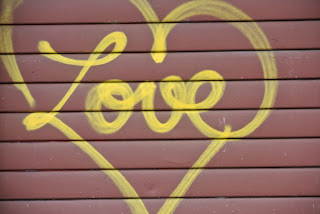 |
| Enter/ing, LA/Mar Vista, January 2013 |
I know.
You wouldn't think I struggle with that, now, would ya?
Look: I do important work.
I Believe in What I Do.
People love me.
I am happily married.
I have a great home, great cats, a wonderful life.
And yet.
And yet.
What?
I am working on one of my memoirs (that's how much I am not sure I have a right to exist - I am writing two memoirs at once at age 35 - I jest, but there's a grain of truth there), and I keep running into my dad. Smack dab into my dad. No matter what I write about him, people say the same thing over and over again:
"Ok. You loved him. I get it. But
why?"
An editor. A critique group. Friends. It's a valid point, one I have addressed before even here. But this time around, it comes when I am trying to pile through my control and anger issues, of which I have plethora. As most people do.
And he's right there, right in the center.
Listen. My dad had a hard life. He was adopted, had a single mom with a disabled sister living at home with them, for whom my dad had to rush home from school and care for. He married my mom, a woman who was not always able to function at top notch, didn't get paid enough, and had three kids. He had two heart attacks, got Diabetes and then cancer in his 50's, then died.
Whew. I know, right?
Today, in therapy, we discussed a memory that keeps reeling back into the scene, one that seems to be blocking any specific details of positive memories of me and him. In short (you want the long one? Read the memoir when it comes out!):
We are eating cheese and crackers late at night.
We are discussing why I have missed so much school lately (nervous kid, sick a lot, wanted to be home with him, though I said none of this then).
He tells me I need to go to school more.
He tells me not to be a nervous person.
He says "You are not a nervous person. I need you to not be a nervous person."
My hips and heart and throat get tense just typing that, though it is an ingrained, old and long-processed memory.
What one critiquer said about my memoir is that it is clear I was not allowed to have feelings as a kid.
Yup.
In therapy, we went even deeper:
I wasn't allowed to have feelings.
It wasn't good to have feelings.
And if I couldn't have feelings, I could exist, but only without them.
So if I had them, I have no right to exist.
That's what my child mind heard when my father said that. And it fit with a lot of other messages from him. He was trying his best to keep a sinking ship afloat. He encouraged all three of us kids to be independent, forthright, political, funny. He also disencouraged our emotions.
Like a lot of deeply held (secret, even) beliefs, this one has blocked my other memories because it seems incongruous that my father could both love me and also somehow tell me that I don't have a right to exist. Well, shit. Talk about a mixed message: one I am sure he got when he was a kid (adopted, early divorce, always caring for others) and I am sure he intended to give to us so we could survive. In other words, he meant well.
Today, I could really feel that for the first time ever: the power of this awful idea that I don't have the right to exist, and the deep need I have had for 35 years to justify my existence: through work (yes, sometimes even the amazing work I do, which, don't worry, I won't stop doing but perhaps I'll be happier doing now!). Throughout my relationships. In everyday speech. All the time.
I know I am not alone in this.
Deep down, inside the core, I believe - some part of me believes - I don't have the right to exist. I know I do - meditation, Basic Goodness, you know, lots of good teachings. Not small stuff. But belief takes more work to re-wire.
I don't need reassurance. But I do need to root out that belief and give it a good airing out. Join me, would you? It's time to take the skeletons out and set generations of not believing we have the right to exist free.






















